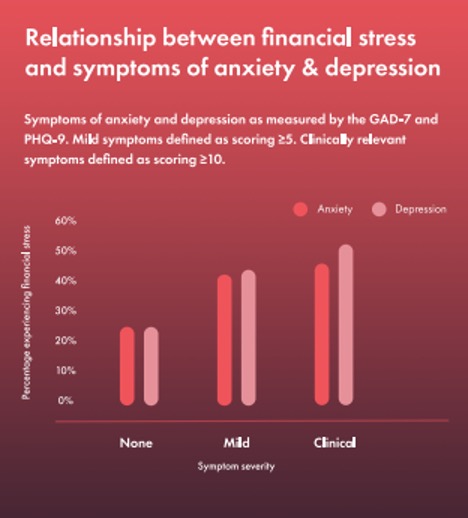
Article by Laura Dallas, Head of Product at Champion Health
I know this to be true, because the Champion Health team and I recently explored the effects of the cost of living crisis in our latest report: Cost of Living Crisis: Financial Stress and Employee Wellbeing.
We analysed anonymous health data from over 2,200 professionals across a range of demographics and sectors. Our aim: to understand how financial stress impacts employee wellbeing and performance.
In creating this report, we uncovered a number of insights into how financial stress is intrinsically linked to both physical and mental health. And one area which quickly drew my attention was how these effects varied across different demographics within the workforce.
In this article, we’re going to explore three key insights from the report. This includes how financial stress is affecting our mental health, female employees like me, and the young workforce.
Our research revealed that symptoms of anxiety and depression are correlated with higher levels of financial stress. Put simply: as symptoms of anxiety and depression became more severe, financial stress became more prevalent.

We also discovered a clear link between money and mental health: better mental health is associated with a healthier relationship with money. This means that organisations need to take steps to support both the financial and mental wellbeing of their employees.
A great place to start is opening up the financial wellbeing conversation in your organisation.
Like mental health, conversations around money are often stigmatised, preventing many employees from seeking the help they need. But to better identify and support struggling colleagues, you need to reverse this trend.
Simple actions, like making sure every employee is aware of the financial wellbeing support you offer or raising financial wellbeing in staff appraisals, will make a huge difference.
By normalising the conversation around money and prioritising the financial wellbeing of your team – you can support your colleagues at a time when they really need it.

As mentioned above, the cost of living crisis does not affect everyone equally. Our research revealed that female professionals are 33% more likely to experience financial stress, compared to their male counterparts.
While there may be many reasons for this, these findings take on added significance in the context of the well-researched gender gap in financial wellbeing. Research by the likes of Aon and JP Morgan finds that this gap exists within key indicators of financial wellbeing – such as pensions, income and financial engagement.
These results highlight the need to prioritise diversity and inclusion within organisational approaches to financial wellbeing, as it is unlikely any wellbeing strategy will be effective without it.
Younger employees are struggling with the cost of living crisis. Our data reveals that employees between the ages of 25-34 are more likely to experience financial stress compared to their older counterparts.
On a more positive note, recent research by Aviva shows that younger employees are also more likely to seek and engage with financial wellbeing support.
This means that younger employees are a demographic in which employers can generate significant impact with their financial wellbeing initiatives.
Financial wellbeing disparities are being exacerbated by the cost of living crisis. Our research highlights the need for employers to provide inclusive support that bridges the financial wellbeing gap between different demographics of the workforce.
To address these issues, employers must recognise the varied pressures faced by different demographics. To discover these, I encourage organisations to gather information on your employees’ current financial wellbeing – either through wellbeing platforms or internal surveys.
Once you have discovered the areas of your business where financial wellbeing support will be most impactful – tailor your financial provisions accordingly. In this instance, our data makes a convincing case for additional financial wellbeing support for female employees and younger employees.
If you’re looking for further ideas and ways of integrating financial wellbeing into your workplace health strategy, check out the report.
Laura has worked in a number of mental health settings across her career, from front-line NHS services to academic research facilities. As Head of Product at Champion Health, she is now responsible for ensuring Champion’s platform drives market-leading engagement with wellbeing.
October
01nov09:0016:30KIN: Know. Inspire. Navigate | A Day for Women to Realign, Renew, and Rise
01/11/2025 09:00 - 16:30(GMT+00:00)
Henley Business School, Greenlands
Henley-on-Thames, RG9 3AU
Set on the tranquil banks of the River Thames, Henley’s historic Greenlands campus offers the perfect backdrop for a day of reflection, connection, and
Designed for early to mid-career women across industries who want practical tools they can use immediately, this one-day retreat follows the Kinspace KIN framework – Know, Inspire, Navigate – guiding you to:
This is not just a feel-good day. It’s sustainable learning – you will leave with your own action and implementation plan tailored to your life, so you can apply what you’ve learned immediately and keep building momentum long after the retreat.
In the afternoon, slow down and reconnect with your senses in a mindful pressed flower card crafting, writing to self and picture workshop. We’ll ask a few questions ahead of time so we can pair you by goals and stage, and tailor examples to your context. Then, step outdoors for a unique partner reflection in nature – partnering with both the landscape and each other to inspire deeper insight and grounded action.
To help you stay accountable and supported, you’ll have the option to join three monthly follow-up group sessions (at a separate price) designed to check in on your progress, troubleshoot challenges, and keep you moving towards your goals.
This is a confidential and supportive space with limited seats to ensure meaningful connection and participation.
Date: Saturday 1 November 2025
Time: 9:00 AM -4:30 PMT
Location: Henley Business School, Greenlands Henley-on-Thames
RG9 3AU
Price: £250 – Early Bird £200 until 10 September
01nov10:0018:30The ADHD & Women Summit - London | Seed Talks
01/11/2025 10:00 - 18:30(GMT+00:00)
Woolwich Works
11 No 1 Street London SE18 6HD
A one-day series of talks and workshops from world-leading experts. Learn about ADHD and the distinct ways women
Learn about ADHD and the distinct ways women experience it from leading experts at this groundbreaking conference.
Research shows that in childhood, boys are diagnosed with ADHD 3-4 times more than girls. By adulthood, the ratio evens out to nearly 1:1 highlighting how girls and women with ADHD are often misdiagnosed and misunderstood in the medical framework.
With increased diagnoses and growing strains on the NHS and other support services, the ADHD & Women Summit aims to increase awareness and knowledge on the specific issues women with ADHD face.
This will be Seed Talks’ largest event to date, with our best speakers, most engaging workshops and favourite partners all in one space.
👭 Connect and network with like-minded individuals
🧬 Discover practical strategies for navigating life with ADHD
🎓 Hear from leading experts – including those with lived experience and those working in the field
👩🏫 Immerse yourself in a full day of talks and workshops
